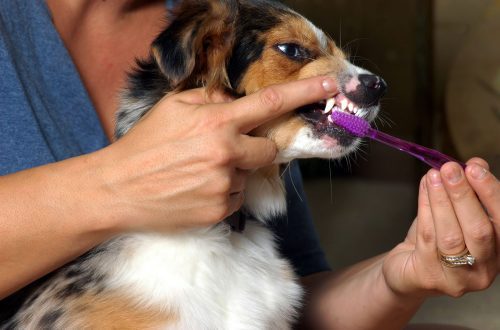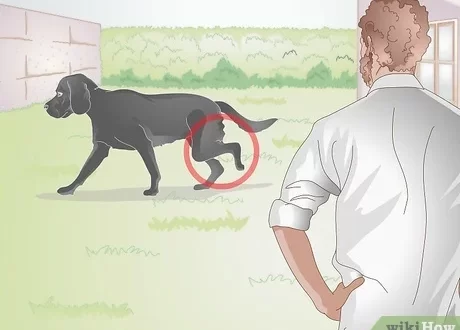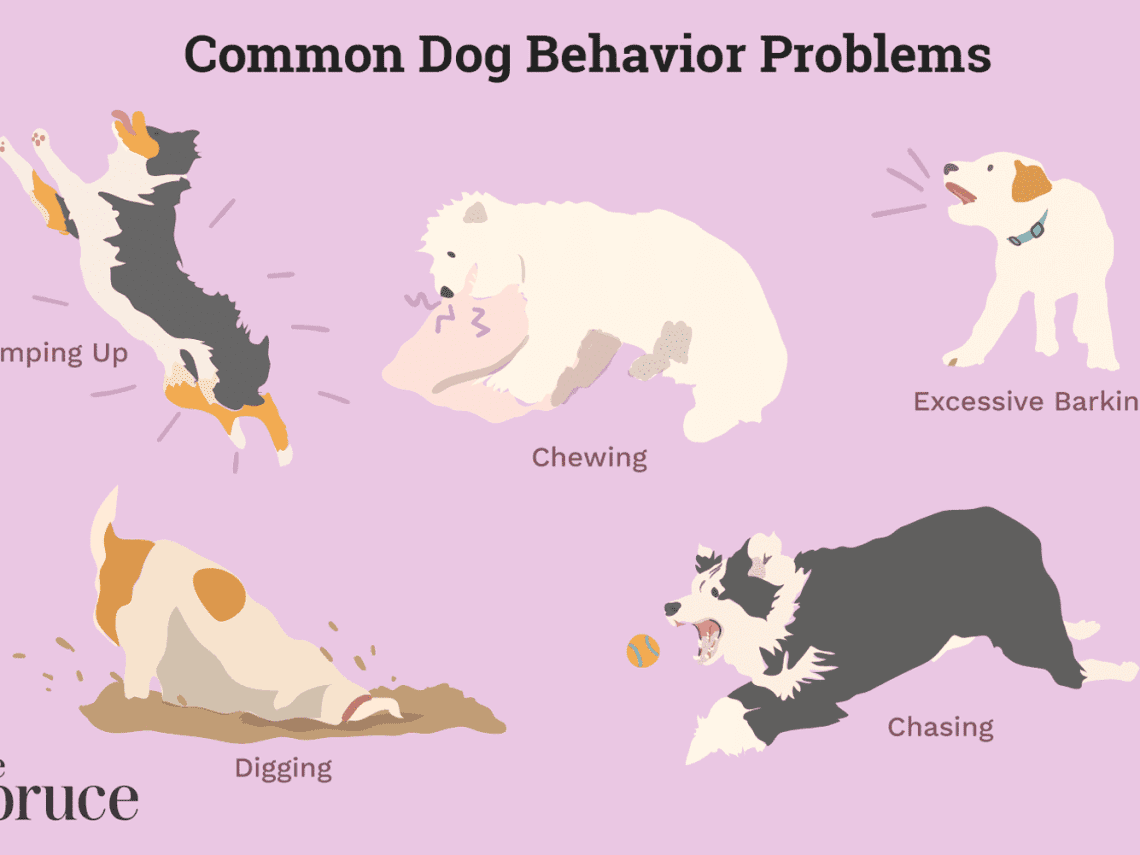
Common Dog Behaviors
Your puppy’s behavior will tell you a lot about his mood. And while you may not be fluent in canine language—except for the meaning of profuse salivation—you need to learn to understand dog behavior. Have you ever seen your dog lick something or spin around in one place? There are many reasons why a certain mood in a dog can cause him to do certain things. If you pay attention to her behavior, you will be able to help her if necessary.
Contents
- 1. Bad breath
- 2. If the dog bites
- 3. If the dog is spinning in place
- 4. If the dog digs the ground
- 5. If the dog eats feces
- 6. If the dog presses his head against the wall
- 7. If the dog is breathing heavily
- 8. If the dog constantly sits at your feet or on them
- 9. If the dog scratches the anus on the ground
- 10. If the dog urinates in the house
- 11. If the dog yawns
- 12. Anxiety can manifest itself in a variety of ways.
1. Bad breath
In general, dogs breath is not fresh, but if you notice even the slightest unpleasant change, it may be time to go to the veterinarian. We can talk about diseases of the dog’s oral cavity.
Changes in the smell from the dog’s mouth can also indicate problems with the gastrointestinal tract, liver, or kidneys. If the breath smells like urine, this may indicate, for example, problems with the kidneys. A sweet smell from the mouth suggests that the dog may have diabetes (especially if he drinks a lot and urinates more often than usual). The general mood of the dog may remain good, but if there is a change in the smell from the mouth, you should pay attention to this and inform the veterinarian..
2. If the dog bites
Puppies may lightly bite their owners as they learn to communicate with them. This often happens during play as young dogs often learn to communicate with their mouths. It can also happen during class or for reasons you don’t understand. However, if your puppy is biting excessively, it is important to wean it off before it develops into a habit that can lead to more serious behavioral problems in the future.
Dogs bite out of excitement, fear, or aggression. Can you identify the reason why your dog bites? Does her mood affect her actions? If you’re having trouble getting your dog to stop biting, consider hiring a professional trainer or, better yet, a dog behaviorist. Your veterinarian will surely be able to recommend such specialists to you..
3. If the dog is spinning in place
A dog that does not stop spinning in place may have health problems. Yes, sometimes chasing your tail is a lot of fun, but if your pup becomes obsessive about it, it may be due to certain internal reasons. Ear infections can cause a dog to spin on its axis, and bull terriers can have a compulsive pursuit of their own tail.
Of course, such actions may be due to other reasons. Older dogs can suffer from idiopathic vestibular syndrome, and as scary as it sounds, all dogs are at risk of poisoning or brain tumors. Only a veterinarian can determine the true cause of your dog’s rapid rotation around its axis, so take it for a consultation.
4. If the dog digs the ground
Dogs dig for many reasons: to escape, to chase animals, to lie down, or to hide something important. However, these habits in dogs can also be due to “internal digging”. Have you ever noticed how your dog scratches the bedding or sofa to get comfortable? This behavior in dogs occurs most often at night or when it is time for naps, and this is completely normal.
But if your dog’s behavior is starting to bother you or ruining your furniture, consider working with a professional trainer to help your dog get rid of the compulsive habit..
5. If the dog eats feces
Dogs may eat feces for a variety of reasons; this may be quite normal (no matter how unpleasant it may seem to us). Puppies may, seeing how the mother licks them (and swallows feces as a result), try to imitate her actions. Even fear can cause a dog to eat its own stool if it is afraid of being punished. Again, the dog might just be curious. She can smell certain smells in her stool and wonder what they taste like.
Eating feces can also be a natural response to nutrient deficiencies. You should feed your dog a complete food, such as Hill’s Science Plan, so that malnutrition can be completely eliminated from the list of reasons for the dog to eat feces. Contact your veterinarian, especially if the dog is losing weight at the same time.
6. If the dog presses his head against the wall
If you notice that the dog is pressing its head against the wall or other fixed objects, you should immediately pay attention to this. The desire of a dog to lean his head against the wall is a common symptom of many different serious diseases, such as toxic poisoning or brain diseases. You should immediately book your dog for an appointment with a veterinarian.
7. If the dog is breathing heavily
Dogs remove most of the heat from their bodies through their mouths. If the dog is breathing heavily, it is likely that he is too hot and is trying to regulate his body temperature in this way. However, it is important to pay attention to shortness of breath as it can be caused by pain. Help your pet regulate body temperature and make sure he’s well hydrated before any physical activity – especially when it’s hot outside. If your dog is injured, take him to the veterinarian immediately. Shortness of breath can also be a symptom of some other health problem, so if you have any questions, don’t hesitate to contact your veterinarian.
8. If the dog constantly sits at your feet or on them
This behavior is often confused with possessive ambition, but is most often a sign of anxiety or nervousness. It is unlikely that the problem lies in the desire to dominate – most likely, your dog just wants to feel safe.
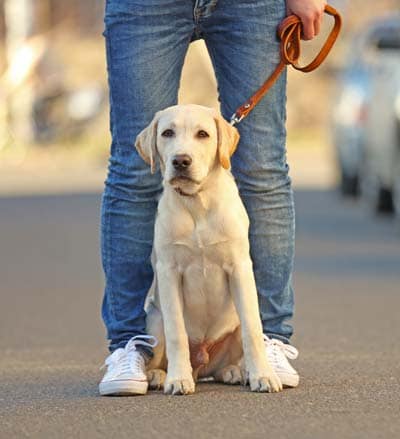
Dealing with anxiety is rarely the job of a professional trainer, so discuss these behaviors with your veterinarian and decide with them if seeing a behavioral specialist would help your dog.
9. If the dog scratches the anus on the ground
Have you ever noticed how your dog … rides backwards on the floor? This can look very funny (or unpleasant). But such actions, which are called “anal scratching,” may indicate that the dog is worried about irritation in the anus. Your puppy’s anal sacs may be full and need to be emptied.
If it’s not the overflow of the anal sacs, the dog may be bothered by irritation for another reason. This could be a sign of an allergy. Although it is often customary to blame such manifestations of worms, they are very rarely the cause. Talk to your veterinarian to make sure your pet is on a proper parasite prevention program.
Finally, a dog that loves to eat grass outside or lick things around the house may be irritated by blades of grass or hairs stuck in its anus, which it scratches on the ground to get rid of these sensations. This is the most innocent of the reasons for such actions of a dog, which you will easily deal with..
10. If the dog urinates in the house
If your dog is toilet trained outside, you might be surprised to see him urinate on the carpet. Dog behavior rarely changes without any reason. Dogs that have been potty trained outside for a long time and suddenly start urinating indoors need urgent attention! This may indicate serious problems for your furry friend, and if he pees too often – even if he does it in the right place, it may be a symptom of a urinary tract, bladder or kidney infection. In older dogs, this can be a sign of dementia.
11. If the dog yawns
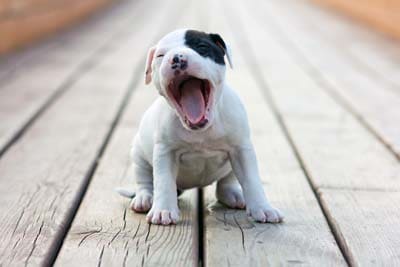 You might think that your pet hasn’t had enough sleep, but in dogs, yawning is rarely a sign of fatigue. Your dog may not mind taking naps, but yawning can also be a sign of fear or stress. If the dog yawns rapidly in the company of a new person, do not rush the acquaintance. She is either uncomfortable or scared (which is less obvious). Regardless of the reasons, forcing a dog to forcibly meet a new person is not worth it.
You might think that your pet hasn’t had enough sleep, but in dogs, yawning is rarely a sign of fatigue. Your dog may not mind taking naps, but yawning can also be a sign of fear or stress. If the dog yawns rapidly in the company of a new person, do not rush the acquaintance. She is either uncomfortable or scared (which is less obvious). Regardless of the reasons, forcing a dog to forcibly meet a new person is not worth it.
12. Anxiety can manifest itself in a variety of ways.
According to PetMD, signs of anxiety include shaking, tail twitching, running away, defecation in the house, biting or hurting yourself, barking, and more.
Since the dog is technically a pack animal, it may be afraid to be alone at home. If separation anxiety is a chronic problem for your dog, you need to learn how to create a relaxing atmosphere when you leave home. You can take your dog for a long walk or play in the back yard to exhaust him before leaving home. However, do not make a tragedy out of your departure. If you’re having trouble coping with separation anxiety on your own, consider hiring a dog behavior specialist.
If your dog exhibits any of the behaviors described above that are not normally hers, contact your veterinarian to rule out systemic medical problems. If your dog is usually very outgoing and energetic, he will not become lethargic and withdrawn for no reason. If this is happening, then she is asking for your help..



